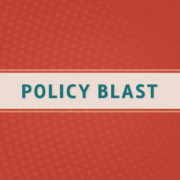NCUIH Submits Comments on Fiscal Year 2023 Appropriations Priorities to the Office of Management and Budget
On May 18, 2022, NCUIH submitted written comments and recommendations in response to the Office of Management and Budget (OMB) Dear Tribal Leader letter seeking Tribal consultation on appropriations priorities for programs and services that serve Tribal governments, organizations, and peoples in Fiscal Year (FY) 2023. Though NCUIH noted recent investments in the Indian Health Service (IHS) discretionary budget, the comments highlighted evidence that funding falls far short of documented need and fails to address inflation in the cost of medical care, particularly for the 70 percent of American Indians/Alaska Natives living in urban areas. NCUIH made six key recommendations to fully fund and support health services for Native organizations and communities, including urban Indian organizations (UIOs).
Background
OMB serves as a clearinghouse for budget formulation by developing overarching presidential priorities, coordinating across agencies, and publishing the annual President’s Budget. Last year’s Presidential Memorandum on Tribal Consultation and Strengthening Nation-to-Nation Relationships established an ongoing priority to uphold the federal trust responsibility through tribal engagement and consultation. Consistent with this memorandum, the OMB initiated a Tribal consultation to promote tribal priorities in the FY 2023 President’s Budget on April 25, 2022. Officials sought comment on programs that serve Tribal governments, organizations, and communities. In particular, the agency noted interest in feedback on shifting funding for IHS from discretionary to mandatory and reclassifying 105(l) Lease costs.
Current Action
NCUIH made six recommendations to improve delivery of health services to AI/ANs living in urban areas through the FY 2023 budget, including:
- Fully Fund Urban Indian Health at $949.9 million for FY 2023.
As of FY 2018, the average health care spending is $11,172 per person, however, Tribal and IHS facilities receive $4,078 per IHS-eligible patient. UIOs receive just $672 per AI/AN patient from the IHS budget, significantly below federal per capita spending levels. This forces UIOs to operate on very slim margins, causing significant difficulty during unforeseen events.
- NCUIH supports the President’s FY 2023 Budget proposal for mandatory funding for the IHS.
Since 1997, IHS has only once received full-year appropriations by the start of the fiscal year (FY 2006). This leaves the IHS subject to government shutdowns, automatic sequestration cuts, and continuing resolutions, which negatively impact patient care. For instance, during the 35-day government shutdown at the start of FY 2019, UIOs were forced to lay-off staff, reduce hours, reduce services, and some, unfortunately, had to temporarily close their doors due to the lack of funding. Mandatory funding for IHS is necessary and long overdue to ensure stable and predictable funding for AI/AN healthcare that is exempt from the political process.
- NCUIH requests that OMB hold a separate urban confer with UIOs to discuss the budget request for urban Indian health programs.
IHS is the only federal agency with an Urban Confer Policy—no other agency, including agencies under the Department of Health & Human Services (HHS) that oversee programs for UIOs, has an established mechanism for dialogue with UIOs. Outside of the IHS Urban Confer process, urban AI/ANs have no specific representation with federal agencies regarding health care matters that affect them, leaving them on the margins of critical conversations on AI/AN health care that occurs across the Executive Branch.
- Create a Tribal Office and a Tribal Advisory Committee with UIO Representation
During the recent virtual OMB consultations, Tribal leaders asked for a permanent position within OMB dedicated to AI/AN health care, a liaison between Indian Country and OMB, and/or an Office of Tribal Affairs within OMB. This new position or office would help coordinate communication and facilitate outreach to address budgetary shortfalls. NCUIH supports this request and stresses that UIO consultation and involvement is imperative to fulfill the President’s vision to improve health equity for AI/ANs. NCUIH also supports the request that OMB establish an OMB Tribal Advisory Committee with UIO representation.
- NCUIH requests that OMB provide an exception apportionment that is inclusive of the entire I/T/U system.
In the absence of an exception apportionment, if Congress does not reach a budget agreement in time and the federal government must shut down, UIOs are subject to the shutdown. Federal shutdowns require UIOs to lay off staff, reduce hours and services, and even shut their doors, ultimately leaving their patients without adequate health care. During the 2019 shutdown, multiple patients died while an East Coast UIO was closed.
- Improve data accuracy for urban AI/ANs
OMB’s Office of Information and Regulatory Affairs (OIRA) oversees the implementation of federal government-wide policies in the areas of information policy, privacy, and statistical policy. In this field of practice, the establishment of statistical standard practices is a critical government function. When searching for and comparing health indicators, assessing the health status of entire AI/AN communities, testing academic research using vital statistics, and conducting epidemiological studies in support of public health, it is very common to wrestle with misclassifications of race for AI/AN people. This is due, at least in part, to the fact that tribal membership or descendancy is a political status classification, not a racial category. .NCUIH requests that OMB consult with NCUIH and UIOs to ensure that OIRA’s statistical standard practices appropriately account for urban AI/ANs. Additionally, NCUIH requests that OMB commit to continuously consulting and working with NCUIH and UIOs to improve OIRA’s data accuracy for urban AI/ANs
NCUIH will continue to monitor the FY 2023 budget formulation process and report developments across federal agencies and in Congress.







Leave a Reply
Want to join the discussion?Feel free to contribute!